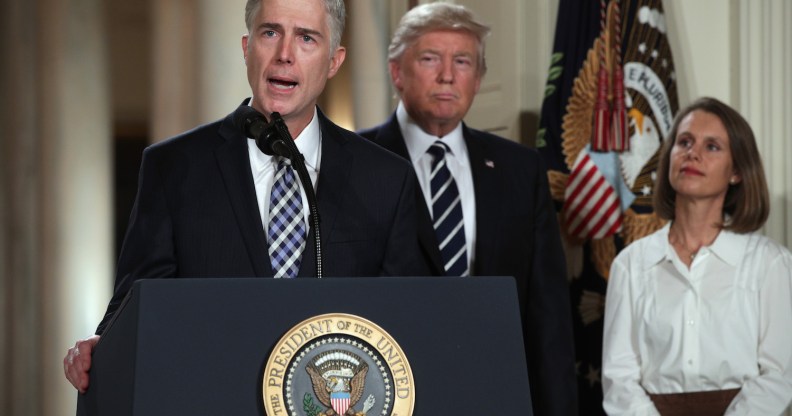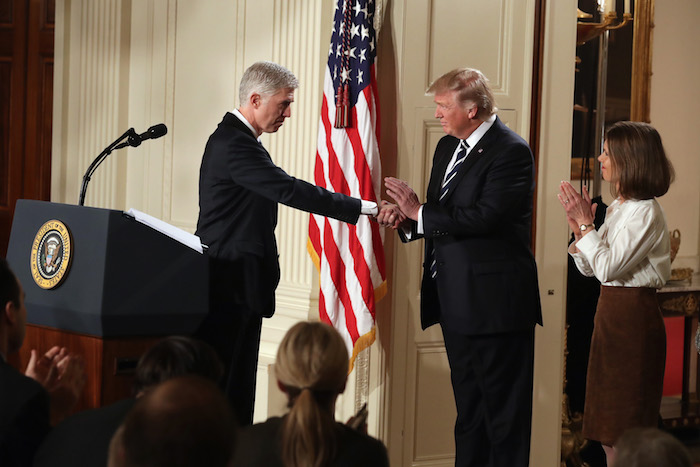LGBT groups oppose Trump’s conservative Supreme Court nomination Neil Gorsuch

LGBT groups have raised concerns over President Trump’s nomination for a vacant seat on the US Supreme Court bench Neil Gorsuch.
Trump said he had Antonin Scalia in mind when he picked Colorado judge Gorsuch for the vacant seat.
The staunchly anti-LGBT justice Scalia died last February.

Of the late justice, Trump said his “image and genius was in my mind throughout the decision-making process.”
Gorsuch has taken a conservative stance on a number of issues, including some LGBT cases.
According to the National Review, Gorsuch said marriage equality is part of the liberal social agenda, saying: “American liberals have become addicted to the courtroom… as the primary means of effecting their social agenda on everything from gay marriage to assisted suicide…”
The Colorado appeals court judge back in 2015 joined a ruling against a trans woman who was denied access to hormone replacement therapy while in prison.
He agreed with the ruling which stated that the woman’s treatment while incarcerated did not amount to cruel and unusual punishment under the US Constitution.
Concerns have also been raised by the Human Rights Campaign over his joining in a decision by the Tenth Circuit Court of Appeals’ decision in the Hobby Lobby v Sebelius case.
The HRC states that the case “asserted that some private corporations are “people” under federal law and have a right to deny basic healthcare coverage if it violates their religious belief. This expansive ruling could allow employers to deny transgender employees access to hormone treatment, access to birth control and other crucial health care for LGBTQ people.”
“Never in the history of our movement have we had more at stake as a community, or as a country,” said HRC President Chad Griffin.
“He has nominated Judge Gorsuch to the Supreme Court, fulfilling his campaign promise to nominate a justice in the mold of Antonin Scalia, one of the most vehemently anti-LGBTQ justices to ever sit on the court who once went so far as to compare gay people to murderers. The Supreme Court has played a central role in advancing the promise of equality for LGBTQ Americans, and Judge Gorsuch’s anti-equality record — from opposing crucial medical treatment for a transgender person to supporting a license to discriminate for private corporations — make him unfit to sit on the nation’s highest court. We cannot afford a justice who will roll back our rights, or who will be a rubber stamp for Donald Trump’s unconstitutional actions. And America cannot afford to have Judge Gorsuch on the Supreme Court. We oppose this nomination.”
The HRC urges Senators to oppose the nomination of Gorsuch.
LGBTrump supports the decision however, stating: “President Donald Trump’s nomination of 10th Circuit Appellate Judge Neil Gorsuch to fill the Supreme Court seat left vacant by Justice Antonin Scalia’s untimely death is a good sign for the LGBT community. Though LGBT foes of President Trump will try to paint Judge Gorsuch as an anti-LGBT zealot, such a charge stands on feet of clay.
“Judge Gorsuch’s record on LGBT rights is largely non-existent and the chief complaint against him is that he supports religious liberty. To assume Judge Gorsuch’s desire to protect one of the oldest constitutional rights in American jurisprudence equates to hostility towards the LGBT community is fear-mongering at its worse. Religious liberty and LGBT rights can live in harmony, but there must be some give and take. This is the balancing act Judge Gorsuch is trying to strike and we, as Americans, should support him for such an effort.
“For that reason, the LGBT community should support the nomination of Judge Gorsuch to the Supreme Court and thank President Trump for such a measured choice.”
The President has also been planning to fill a seat which could be vacated by liberal justice Ruth Bader Ginsburg, who is 83 and has had some health issues in the past.
Trump had been considered appointing William H Pryor Jr, who has in the past suggested that same-sex couples should be punished with jail for having sex in their own homes. Mr Pryor has also been forced to deny that he posed nude for gay porn while a student.
The former Alabama Attorney General defended a law in 2003 in Texas which criminalises consensual gay sex, comparing it to “polygamy, incest, pedophilia, prostitution, and adultery”.
Arguing that LGBT people were not protected by the US Constitution, Pryor said in a legal brief about the law that states should be able to criminally charge gay people for having sex.

